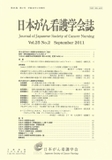Japanese
English
- 販売していません
- Abstract 文献概要
- 参考文献 Reference
- サイト内被引用 Cited by
要旨
Jonsen4分割表を用いた臨床倫理カンファレンスが医師と看護師に与える影響と,臨床現場の医師と看護師がとらえる臨床倫理的問題とは何かを検証した.2006年3月より血液内科病棟で週1回の臨床倫理カンファレンスを実施,医師3名と看護師10名を対象に,臨床倫理カンファレンスに関する半構成的面接を行い,質的帰納的方法でデータ分析した.看護師への影響要因は14カテゴリー,4つのコアカテゴリー,<自己成長>,<プライマリーナースの自覚>,<チームアプローチの重要性認識>,<達成感を得る>を導きだした.医師への影響要因は8カテゴリーと4つのコアカテゴリー,<自己成長>,<チームアプローチの重要性認識>,<看護師の変化を知る>,<チーム全体の意欲が増す>を導いた.医師・看護師が臨床倫理的問題ととらえていることは6つのカテゴリー,<患者の不信感・拒否>,<重大な決定機会の多さによる不安・ゆらぎ>,<対処能力の未熟さ>,<治療方針へのジレンマ>,<医師と看護師のコミュニケーション不足>,<医師は患者の心理面を考える機会が少ない>を導きだした.看護師はJonsen4分割表をまとめることが患者・家族を全人的にとらえる機会となり,医師も看護師の成長が病棟全体の雰囲気の変化につながると実感していた.臨床倫理カンファレンスは,看護師が医師にケア目標を提案する機会,医師が看護師の意見を知る機会ととらえており,医療チームの情報ツールとして機能しつつあった.医療現場の臨床倫理的問題を解決に向けて意見交換する機会となり,患者の全体像を把握するうえで有用である可能性が示唆された.
Abstract
The primary aim of this study was to identify the components of influence on physicians and nurses participating in clinical ethics case conferences using the four quadrants approach described by Jonsen et al. The second aim was to determine how physicians and nurses feel about clinical ethics, through qualitative interviews. From March 2006, we scheduled a weekly conference in the Hematology Ward. Three physicians and ten nurses were recruited from the ward for semi-structured interviews. Content analysis was applied to their answers; 14 categories were extracted and classified into the following 4 core categories as the components of influence on nurses:(1)self-growth,(2) awareness of the primary nurse,(3)awareness of the importance of the team approach and(4)sense of accomplishment. Alternatively, 8 categories were extracted and classified into the following 4 core categories as the components of influence on physicians:(1)self-growth,(2)awareness of the importance of the team approach,(3)understanding nurses' professional development, and(4)increase in motivation of the medical care team. We then presented 6 categories as clinical ethics issues considered by physicians and nurses:(1)patient distrust of nurses and physicians, and nurse and physician distrust and negative response to patients,(2)anxiety and hesitation due to many serious decisions, (3)immature ability to address problems,(4)dilemma of treatment strategy,(5)weaknesses in communication between physicians and nurses, and(6)physicians' limited opportunities to think about the psychological aspects of the patient. Through the conference using the four quadrants approach, nurses were able to understand patients from many perspectives including disease status, medical indications, patient preferences, patient quality of life, and contextual features. Physicians recognized that the professional development of individual nurses created an atmosphere change for the entire ward. The conference is an opportunity for the nurses to share their perceptions with physicians, which benefits the team approach. The conference is useful for physicians and nurses to discuss resolving clinical ethics issues and understanding detailed information about patients as individuals.
Copyright © 2011, Japanese Society of Cancer Nursing All rights reserved.


